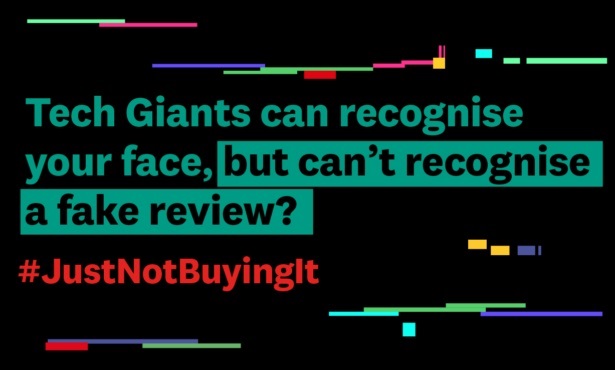The proliferation of online ratings and reviews for products, services and businesses continues to play a vital role in the growth and market adoption of prominent ecommerce sites like Amazon and service marketplaces such as Yelp and Angi. In fact, online reviews have become such an important and entrenched aspect of online commerce that online review fraud, AKA Fake Reviews, has become a leading method of false advertising in the modern world.
For many industry members and prolific online shoppers, fake reviews have been an open secret for many years. Intelligent bot software and incentivized human reviewers are the two drivers of many fake reviews, both, of course, fueled by unscrupulous companies desperate to win at the online reputation game.
Though online review fraud is unfortunately here to stay, this article contains ways for you to be guarded against egregious exploitation of fraudulent ratings to prevent regretful purchases of products and services.
These tips are meant to help you become smarter at deciphering inauthentic reviews with both tools and your own cognitive abilities. However, our aim is certainly NOT to declare (like some fatalistic and over dramatic consumers and critics) that online reviews cannot be trusted ever and therefore should not be used at all.
We strongly recommend taking these tips to heart when in the market for high-cost professional services such as home renovations. While you can quickly forget about a bad restaurant experience, a poorly informed hire of a professional services firm can be felt financially and emotionally for many years to come.
We endeavor to provide an updated and somber look at the realities of untrustworthy reviews and how best to navigate this dynamic landscape.
Table of Contents
- The State of Fake Reviews
- Key Fake Review Stats
- What are Fake Reviews?
- Types of Fake Reviews
- Traits of Fake Reviews
- Tools to Detect Fake Reviews
- How to Combat Fake Reviews
- Traits of Quality, Authentic Reviews
- Additional Fake Review Resources
- Related Articles
The State of Fake Reviews
Whether you have or have not been aware of the proliferation of fraudulent reviews on popular sites like Amazon and Yelp, they are here to stay. The good news is that fake reviews have grown to such a scale that they have attracted the attention of both for-profit and non-profit entities to combat them on behalf of consumers.
While members of Big Tech (e.g. Google, Amazon, Facebook, Yelp) have publicly committed to combating fake reviews, no systematic approach will ever be 100% foolproof. Furthermore, under Section 230 of the Communications Decency Act, Google, Yelp, Trustpilot and other platforms are generally shielded from legal liability for fraudulent content posted by third-parties on their sites.
The first step to becoming a smarter shopper is to be aware of the realities of online deception.
Key Fake Review Stats
- 91% of US consumers say that positive reviews make them more likely to use a business
(BrightLocal 2020 Local Consumer Review Survey) - 79% of US consumers say they trust online reviews as much as personal recommendations from friends or family (BrightLocal 2020 Local Consumer Review Survey)
- 78% of people said Amazon product reviews play a big role in their purchase decisions
(PC Mag) - 68% of UK adult consumers have little or no trust in online platforms to protect them from scams, dangerous products or fake reviews (Which?)
- 67% of US consumers question the authenticity of reviews (BrightLocal 2020 Local Consumer Review Survey)
- Google is the most popular source for reviews, with 59% of US shoppers using it, while Amazon is the 2nd most popular source of reviews with 57% (Bizrate Insights, 2021)
- Consumers are 15 times more likely to have a negative experience from a company with fake reviews (Ask for Transparency)
- Amazon analyzes over 10 million review submissions per week to detect fake reviews before they are published (PC Mag)
- Google & Amazon have removed over 450 million fake reviews over the past 2 years
(The Transparency Company) - The first FTC case challenging fake paid reviews was in February 2019 (FTC)
- Being found guilty of deceptive marketing tactics, such as paying for fake reviews, could incur a fine of more than $10 million for a US-based vendor (SafetyDetectives)
- Amazon banned unauthorized incentivized reviews in 2016 (Amazon News)
- In May 2021, SafetyDetectives discovered an open database that contained direct messages between Amazon vendors and customers to facilitate fake reviews in exchange for free products. The database consisted of 13M records and 7GB of data that could potentially implicate over 200,000 people involved in fraudulent behavior. (SafetyDetectives)
- Trustpilot has a 70+ person Content Integrity Team focused on fake reviews
What are Fake Reviews?
Fake reviews encompass a broad group of online evaluations that include several types of inauthentic viewpoints that can be classified as: deceptive; false; inaccurate; machine or bot created; biased; incentivized; or malicious. Fake reviews are typically used to either bolster or diminish a product or company’s reputation deceptively, which will likely correlate to an increase or decrease in related sales. Fake reviews can also be neutral.
Types of Fake Reviews
Though the concept of fake reviews conjures up the thought of “intelligent” bots, there are in fact several types of fake reviews that proliferate around the web, including:
- Bot Reviews
- Biased Reviews
- Incentivized Reviews
- Malicious Reviews
- Merged Reviews
- Troll Reviews
- Nonsensical Reviews
Bot Reviews
Bot reviews are automated by AI-enhanced software that creates artificial user accounts that then post fake user reviews on products or companies. These bot reviews can be used to either improve product and service ratings, or they can be used to lower the ratings of competitors. Fake Negative Reviews can be especially harmful for firms that compete in local markets for infrequent, high-cost jobs, like home renovations.
Biased Reviews
Biased reviews are typically reviews posted by real people that are inherently biased by their relationship to a given company and its associated products and services. An example of this is having employees, friends and family members write glowing reviews for one’s products and services. These types of reviewers are also referred to as Review Clusters, as they tend to post in bunches within a short period of time, especially around a launch of some kind (e.g. new movie; new TV series; new business; new product; new service).
Incentivized Reviews
Incentivized reviews are the most difficult to police against, as they normally involve persons working in tandem to post verified purchase reviews that go around review policies of major sites like Amazon. The most common scenario of this type of fraud is where sellers find reviewers through brokers on Facebook groups. Reviewers make verified purchases on Amazon under the auspices of receiving a refund via PayPal after a review has been posted. Reviewers are compensated with the free merchandise and can receive an additional payment, as well.
A less blatant version of incentivized reviews is when a vendor offers a smaller incentive, such as a discount coupon, if a customer posts a review of a minimum star rating. This practice is strictly prohibited by Amazon of their online reseller partners.
Malicious Reviews
Malicious reviews are typically negative reviews posted on competitor product pages or company profile pages. This unprofessional practice tends to be more prevalent within local marketplaces like Yelp, as it does not take many negative reviews to impact the listing position and reputation of a business.
Another form of malicious reviews are of a personal nature, where an adversary (e.g. disgruntled ex-employee; former business partner; ex-spouse; ex-lover; ex-friend; feuding family member; etc.) makes public attacks against their adversary’s business on review sites.
Another popular form of fake malicious reviews are exaggerated claims made by real customers that are deceptively trying to get some kind of “make good” or discount.
There have also been instances of malicious activity on Amazon where competitors make a high volume of purchases from direct competitors, with the intent of returning purposefully damaged goods and reporting their “poor” customer experiences to Amazon, with the aim of having the ecommerce giant punish the competitor.
Merged Reviews
Merged Reviews is the process where resellers on marketplaces like Amazon can consolidate the reviews of older, “retired” products into newer products. These types of reviews are easily detected when noticing details mentioned in reviews that do not pertain to the current product. This deceptive practice is helpful for vendors to make their new products more competitive on Amazon against products that have a formidable number of strong reviews.
Troll Reviews
Troll reviews are less harmful reviews that have the primary intent of using an online review to make a joke or to insult the company or its customers, often with sardonic humor.
Nonsensical Reviews
We created this additional category of fake reviews, as there are even reviews that sometimes defy rational explanation. An example is negative reviews being posted by mentally ill posters, with stalking tendencies.
Traits of Fake Reviews
Here are traits to look for when reading reviews without the aid of any meta review tools:
- High Number of 5-Star Ratings for an Unknown Brand
- Deceitful startups have been known to boost fake reviews to compete against established products and brands
- Short, Unspecific Statements
- g. “works great and looks terrific!”
- Short reviews are also a sign that the main intent may have been to skew the star rating
- Excessive Use of Exclamation Points
- Over-the-Top Sentiment
- Use of hyperbole, like over use of the words “love”, “incredible”, “best ever” etc.
- Over-the-Top Negative Customer Experience
- Though we are all likely to have been irate customers, there many negative reviewers that are motivated by the expectation of getting some kind of “make good” from customer support by complaining the loudest and most often
- Suspicious User Accounts
- Recently created
- High number of reviews over a short period of time
- Reviews that do not read authentically
- Yelp Elite Reviewers
- Be very wary of any reviewers with an extremely high number of reviews, especially in categories that typically represent rare or infrequent life occurrences, like home renovations and moving services
- Inaccuracy
- Details of the review does not match specific product (e.g. Merged Product Reviews)
- Transparent Incentivized Reviews
- Even when reviewers transparently state receiving a complimentary product or discount, studies have shown that their reviews will be biased to be more favorable due to the human trait of gratitude
- Review Clusters
- Seeing several reviews that were posted within a short time period, relates to Biased Reviews and product launches
- Examples of this can likely be found when comparing the first reviews of a new movie posted on IMDB and then comparing reviews posted organically over a longer period of time
- Similar Messaging
- Reviews that underscore similar key messaging and benefits of the brand & product are likely incentivized as this is common request of a fake review “job”
- Excessive Details on Features that Do Not Matter
- Whether written by a human or a bot, a lengthy review that does not discuss the most pertinent features of a product is a sign that is likely an incentivized review that it is trying to skirt anti-fake review software
- 5-Star or 1-Star Reviews without Details
- Does Not Make Sense
- Whether a review is fake or not, if it does not make sense to you, simply disregard it
Tools to Detect Fake Reviews
Here are several tools that can make detecting fake reviews easier and seamless with your online shopping experience. Disclaimer: All of these tools have disclaimers on the accuracy and effectiveness of these tools. Any grades or scores produced by their respective tools are classified as “Estimates”. Before using or adopting any of these tools be sure to understand thoroughly how they work and if they meet your expectations and needs.
Fakespot
Fakespot is currently the best-known and most-used fake review tool in the US. The tool provides review grades of authenticity (A-F, with A indicating high authenticity, and F indicating low authenticity) for specific products on the following ecommerce sites:
- Amazon
- Best Buy
- eBay
- Sephora
- Shopify
- Walmart
Some users become confused when seeing a Fakespot grade of F on a product that is considered to be a high quality, reliable product. When using Fakespot it is important to keep in mind that the grade solely refers to their estimate of how trustworthy the reviews are for a given product. The tool is meant to save consumers time and money by using AI (Artificial Intelligence) to detect fraudulent product reviews and third-party sellers in real-time.
Fakespot also gives a grade to the Amazon reseller, which is the average of all of their products’ review grades. The tool is also able to recommend alternative products and vendors to consumers.
Fakespot’s Review Grading Scale
- A & B: Reviews are reliable
- C: Reviews are a mix of reliable and unreliable reviews
- D & F: Low or insufficient percentage of reliable reviews
Fakespot Video: How Fakespot Works
ReviewMeta
ReviewMeta is another leading tool for evaluating the authenticity of Amazon reviews. Unique to ReviewMeta is that the tool assigns reviews one of three statuses for a specific product, based on the presence or absence of fake reviews: PASS, WARN, or FAIL. Additionally the tool adjusts the total rating for a given product based on the authenticity of its reviews, in general: upwards for more authentic reviews; and downwards for less authentic reviews.
ReviewMeta differs from Fakespot in that it only works with Amazon, while it provides more transparent details on how it evaluated a given product’s reviews.
ReviewMeta Video: What is ReviewMeta?
The Review Index
The Review Index is a newer entrant into the product review authenticity space. Their approach is to give a quality score for the reviews of a given product on a scale of 1 to 10, where 10 represents the highest level of reliability. Their goal is to make the product discovery and research process simpler and more reliable by generating a unified, unbiased, summary scorecard representing the public opinion on any product. The site is also able to summarize reviews by product feature. Their detection of fraudulent reviews places more emphasis on the traits of the reviewers.
Objection.co Negative Review Tool
Objection.co is a maker of software that helps businesses identify and dispute illegitimate online reviews. Their mission is to protect businesses and consumers against fake reviews and to improve the overall quality and trustworthiness of online marketplaces. The company specializes in detecting fake negative local business reviews.
Though Objection.co provides online reputation solutions directly to businesses, they do have a free tool that can be used to analyze the text of suspicious negative reviews.
Note: The founder of Objection.co is also the founder of The Transparency Company.
Objection.co Video: American Air Conditioning & Heating Testimonial
The Transparency Company
The Transparency Company is a new off-shoot of Objection.co, founded by entrepreneur Curtis Boyd. Their mission is to provide affordable and quality software that can analyze the legitimacy of online reviews, focused on local businesses. They are aiming to serve as a conduit to connect trustworthy, legitimate businesses with valuable and discerning customers. Though this company is in its early stage, we are excited about their potential, especially in terms of helping homeowners identify and hire trustworthy home renovation and construction professionals.
One of the services that they provide is the ability to generate a premium and in-depth report on a specific service firm, which scores a company on a Pass-Fail basis in terms of quality and trustworthy reviews.
Though they currently charge $6.99 per report, you can generate one free report (AKA company scan) per month, if using their Chrome extension app. Their reports include analysis of reviewer profiles, review content, and geographic location metrics. The Chrome extension currently works with local listings on Google search pages (i.e. Google My Business listings).
The Transparency Company Video: Product Demo
How to Combat Fake Reviews
To help contribute towards fostering more trustworthy online marketplaces and review sites, we encourage pursuing these basic practices:
- Flag or report suspicious reviews, accounts & companies
- Write quality reviews, positive or negative
- Use anti-fake review tools
- Stay loyal to the businesses, sites, brands and products you trust
- Give helpful referrals on community sites like Nextdoor
- Read plenty of non-5-Star and non-1-Star reviews
- Look at the profiles of the reviewers on which you rely
Traits of Quality, Authentic Reviews
Since most research on fake reviews have focused on the traits of fake reviews and not on the traits of authentic reviews, we provide empirical examples of what we believe constitutes authentic and valuable reviews.
Conversely, even fake reviews can be helpful if they help you better formulate the criteria of your purchase decision. In other words, any review that helps you to think in more detail on how you plan to use your product can be helpful.
Traits to Look for in Quality Reviews
- Reasons to buy this product (why it may be a good fit)
- Reasons not to buy this product (why it may be a bad fit)
- Why the reviewer purchased a product (is the intended use similar to yours?)
- How the product or customer service could be improved
- Details on how customer service helped correct an issue
- Additional information on the reviewer that gives relevant context
To prevent you from becoming too jaded and distrusting of online reviews, we recommend spending time looking at reviews within passionate avocational pursuits. We are confident that you will be able to identify real reviews, written by real human beings. Here are just a few example categories to help you get your trust restored:
- Products for Musicians
- Products for Bakers, Chefs & Cooks
- Products for Home Improvement DIYers
- Products for Gardeners
Additional Fake Review Resources
Fake Review Watch
Run by Kay Dean, a former federal criminal investigator, Fake Review Watch is dedicated to exposing the corruption of online consumer review platforms with fake reviews and the culpability of Big Tech companies by not adequately addressing these issues. Kay is clearly making a difference as most, if not all, of the phony reviews and reviewers she points out are no longer available online. We highly recommend subscribing to her YouTube channel. Kay’s videos on Yelp Elite Reviewers are especially invaluable for homeowners that may use Yelp to hire home improvement professionals.
Fake Review Watch Video: How California Contractors Are Faking Yelp Elite Reviews
ScamAdviser
ScamAdviser helps over 3 million consumers every month to discover if a website is legitimate or a scam.
Which? #JustNotBuyingIt
The UK-based Which? (a non-profit consumer advocacy firm and publisher) launched a public awareness campaign – #JustNotBuyingIt – in September 2021 that coincided with the findings from their survey of 2,000 UK adult consumers. Which’s research found that consumers’ trust in Big Tech’s ability to provide protection from unsafe products, fake reviews and scams is appallingly low – 68% of survey respondents claimed that they had little or no trust in online platforms to provide adequate consumer protection.
The goal of the campaign and petition is to pressure the UK Government into requiring Big Tech companies and online platforms to be legally responsible for harmful content on their sites.

Related Articles
- Your Rights to Post Negative But Truthful Reviews Online
- How to Choose a Qualified & Trustworthy Contractor
- How to Hire a Handyman Safely, Wisely & Virtually
- How to Increase Your Chances of Hiring a Good Contractor
- Signs of a Bad Contractor Before You Sign A Contract
- Best Online Legal Services for Homeowners & Property Owners
| Purgula is reader-supported. When you click on links to other sites from our website, we may earn affiliate commissions, at no cost to you. If you find our content to be helpful, this is an easy way for you to support our mission. Thanks! Learn more. |







